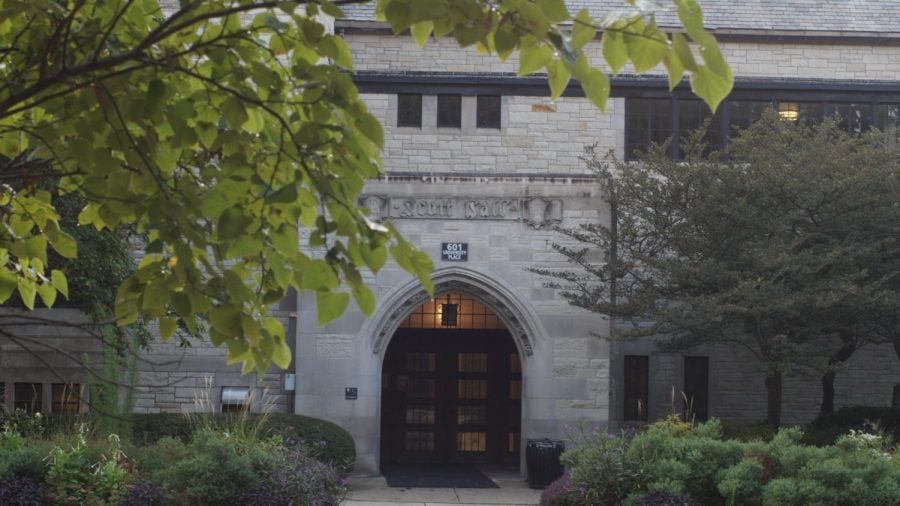Faculty Senate passes resolution to support transfer students, discusses academic integrity concerns with ChatGPT
Daily file photo by Victoria Benefield
Scott Hall. The Office of Institutional Diversity and Inclusion launched an initiative in January to update NU’s online systems, so students, faculty and staff can choose to display their pronouns and preferred names.
March 9, 2023
In its final Winter Quarter meeting Wednesday, the Faculty Senate heard updates from Northwestern’s Office of the Ombudsperson and Office of Institutional Diversity and Inclusion. It also passed a resolution aiming to increase support for transfer students.
At the meeting, Faculty Senate President-elect Regan Thomson announced Christopher Watson, associate vice president for student outreach and dean of undergraduate enrollment, will be retiring. The University is currently in the process of searching for a new head of enrollment, Thomson said.
Vice President and Associate Provost for Institutional Diversity and Inclusion Robin R. Means Coleman then provided updates from the Office of Institutional Diversity and Inclusion, including how it aims to bolster support for queer and non-cis identifying students, faculty and staff.
The Office of Institutional Diversity and Inclusion launched an initiative in January to update NU’s online systems, so students, faculty and staff can choose to display their pronouns and preferred names.
“This is an effort to better align Northwestern’s practices, as far as our online systems, with our values as an institution,” said Michelle Manno, assistant provost for diversity and inclusion, said.
The office is also working to identify locations for new single-stall all-gender bathrooms, Manno said. More than a dozen buildings on NU’s Evanston Campus currently do not have one, they said.
Ombudsperson Sarah Klaper, who became the first person to hold the position after she began in August 2021, also presented on her office’s progress in its second year of operation. Klaper said her office, which provides neutral, confidential problem-solving resources to the University community, has seen 361 visitors, including students, faculty and staff since opening its doors.
The Office of the Ombudsperson also hired a program coordinator last year. In response to faculty questions about whether her office required more personnel support, Klaper said ideally she would have a program coordinator and two other assistant ombudspeople.
“The faculty advocacy for this position has been extraordinarily strong,” Klaper said. “You’ve been very consistent and forceful, and yes, if you happen to be in a position to advocate for additional funding for my office for staff, that would be fantastic.”
The Faculty Senate also unanimously passed a resolution advocating for the University to implement several measures to increase support and resources for transfer students.
McCormick Prof. Jill Wilson, chair of the Senate Educational Affairs Committee, said faculty have advocated since 2021 to ease pathways to NU for community college transfer students.
“Some community college students who are admitted for transfer aren’t able to because they can’t transfer enough credits, or because they need to be part time,” Wilson said. “It’s a complex issue that I think we need to understand much better.”
According to Wilson, as most information about the transfer student experience is currently anecdotal, the resolution calls on the University to collect data from transfer students, especially those who have transferred from community colleges.
To increase transparency around the transfer process to NU, the Faculty Senate also asked the University to publicize a list of courses approved for transfer credit by July 2023 and evaluate procedures for determining transfer credit by the 2024-25 academic year.
Mathematics Prof. Ezra Getzler said Weinberg College of Arts and Sciences Dean Adrian Randolph previously told faculty the limited number of academic advisors is a significant obstacle toward recruiting more transfer students, since these students historically need more frequent and specific advising. To address these concerns, the resolution advocated for NU to create staff positions dedicated to advising transfer students.
Before adjourning for the night, several senators raised concerns about how new generative AI technologies like ChatGPT may affect academic integrity. Thomson said the University is creating a generative AI advisory committee to monitor how the technologies impact academic policies and practices.
English Prof. Barbara Newman, who sits on the Educational Affairs Committee, said the group briefly discussed generative AI technology at its recent meeting but did not come to a consensus on how to best address academic integrity concerns. However, Newman said she would be willing to make a “passionate speech” at the committee’s next meeting to advocate for robust countermeasures against potential academic dishonesty.
“We all ought to make our students sign honor pledges not to use (generative AI technology that) will persuade them to rely on artificial intelligence until their natural intelligence withers away entirely,” Newman said.
Email: maiapandey@u.northwestern.edu
Twitter: @maiapandey
Email: taliawiniarsky2026@u.northwestern.edu
Twitter: @winiarskyT
Related Stories:
— Community Safety Advisory Board gives updates on safety protocols at Faculty Senate
— The Daily Explains: The Organization of Women faculty letter



